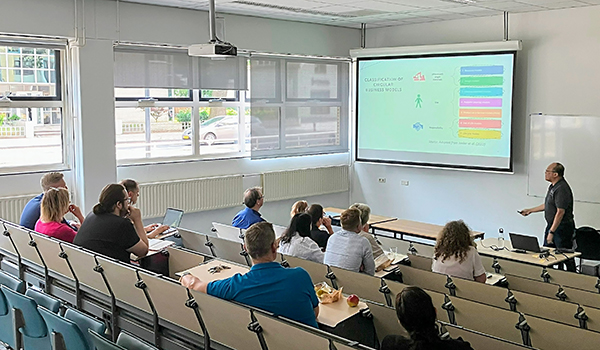
Ferris State University Professor Henry Ho is on sabbatical in the Netherlands, working
on sustainability efforts to guide businesses to less wasteful, more efficient practices.
ENSCHEDE, NETHERLANDS – Ferris State University professor Henry Ho is working with researchers in the Netherlands to help businesses learn how sustainability can help them lower costs while being better stewards of the planet.
Ho, who has taught nine years in the College of Business, is on sabbatical, collaborating with researchers from Saxion University in Enschede.
The longtime international partner institutions are focusing on the benefits of shifting from a linear economy to a circular economy, which aims to reduce waste and endorse a sustainable use of natural resources, through innovative product design, refurbish and re-use, recycling, as well as regenerate nature.
“I hope that this work will stimulate reflection and learning, contributing to the world-class student experience at Ferris State University,” Ho said.
The project, wrapping up two semesters of work, is funded by the Research Group Business Models of Saxion and led by a group including Ho at the Saxion Business Model Lab of Saxion University of Applied Sciences.
“The findings of our study demonstrate that organizations that have successfully transformed into a circular economy have benefited from developing new markets as well as gaining new customers and keeping their existing customers,” said Ho, a professor of Marketing at Ferris.
The research group has conducted interviews with mid-sized organizations currently using the circular business practice in the Netherlands.
Benefits extended to customers but also to other stakeholders such as suppliers and employees.
The studies identified barriers while implementing circular business practice and how organizations overcame the impediments.
Ho and fellow researchers concluded that the findings could be considered a best practice for similar organizations considering making the shift. Resources in a linear economy are converted into products that become waste without maximizing product potential.
“The research findings will also be incorporated into my undergraduate and graduate teaching materials. I will draw on case examples and experience researching the Dutch enterprises and their managers,” Ho said. “Since this is an ongoing research project, this is an opportunity to show how Ferris has actively collaborated with our European partner while also sharing Ferris researcher findings that can be used as ‘best practice’ for today’s business organizations.”
Joining Ho on the research team were Timber Haaker and Kees Schöller, from Saxion.
The research group presented findings at Saxion in Enschede this summer in an event attended by staff, teaching academics and researchers. Ho said that attendees judged the event “a great success,” with delegates describing it as informative and thought-provoking.
Ho’s areas of expertise include consumer behavior, international marketing, market research and strategic marketing. He also focuses on problem-based learning and integrating industry and community involvement, through client-based projects, in his courses.
Prior to joining Ferris State, Ho taught at Swinburne University of Technology and Victoria University in Australia as well as Hamline University in Minnesota.
Before his academic career, he worked for two multinational companies for several years. He received his Doctor of Business Administration from Southern Cross University, Gold Coast and Master of Business in Marketing from Victoria University, Melbourne, Australia.

